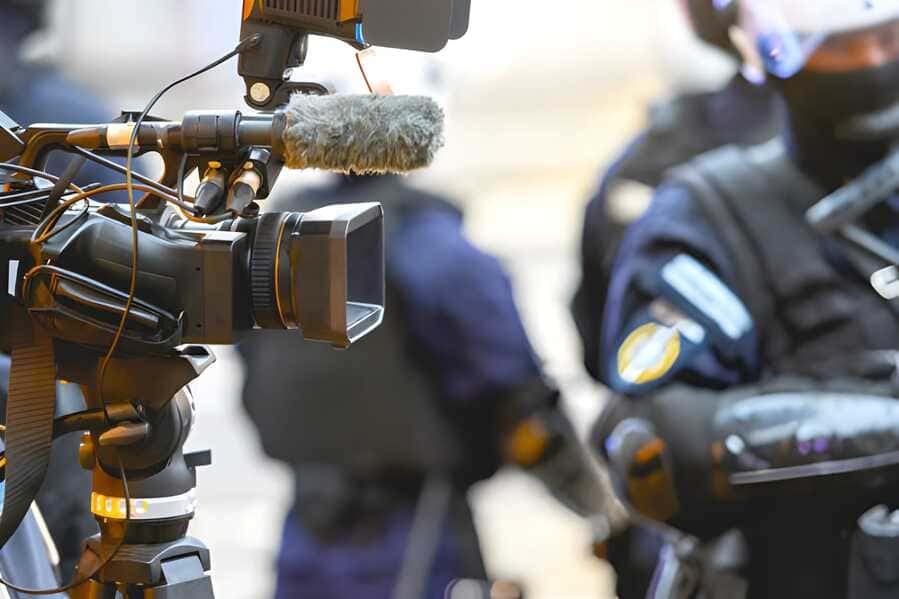Currently Empty: $0.00

What California’s Laws Say About Police Use of Force Against the Press?
Members of the press enjoy enhanced protections due to their job, and they have the right to sue if their legal and constitutional rights have been violated. The Riverside County police misconduct attorneys at The Skapik have what it takes to help you fight back against law enforcement.
There have been recent new laws in California intended to keep law enforcement from arresting and interfering with reporters’ work when there are protests or things like natural disasters. Although these laws are aimed at shielding reporters from arrest, you still have the right to file a civil lawsuit against the police department when you have been wrongfully arrested or subjected to an illegal use of force.
If you are a reporter, and you believe that your rights have been violated, get legal help from an experienced police misconduct attorney at The Skapik Law Group. The law empowers you to take action, and we can fight on your behalf.
California Law Now Gives Additional Protections to the Press
An increase in civil protests in California has led to close coverage by the media. Although there is freedom of the press and laws to protect them, law enforcement often treats the media the same as they do protesters. There have been times when police have also used force against the press in spite of these laws. Journalists and videographers have been arrested on numerous occasions when they have been attempting to cover protests.
After the Black Lives Matters protests of 2020, the California legislature passed a law to increase protections for journalists. Section 409.7 of the California Penal Code grants certain rights to reporters who are covering events when individuals are exercising their First Amendment rights. Specifically, the law states the following:
- A duly authorized member of the press is allowed to enter certain closed areas
- A police officer shall not intentionally assault, interfere with, or obstruct the duly authorized representative of any news service, online news service, newspaper, or radio or television station or network who is preparing to or communicating information to the public
- Reporters who are in a closed area cannot be arrested for failing to disperse when police have given the order to do so
The law does not prevent arrests of journalists who engage in illegal activity themselves. For example, a journalist is not allowed to join in the protest themselves. They cannot block access for emergency personnel, nor can they trespass on private property. Nonetheless, this law still provides important protections to those journalists who are engaging in their role of covering protests and other key events.
You Can File a Lawsuit for the Violation of Your Rights
Although the law is found in the Penal Code, it merely forbids law enforcement from engaging in certain conduct. The law does not allow police officers to be criminally charged for violating a journalist’s rights. In practice, the law is used to secure the release of reporters who have been arrested for covering protests, as opposed to as a basis for these journalists to file a lawsuit against the police department.
However, a journalist who has been wrongfully detained or subjected to physical force from law enforcement has other remedies under the law to seek compensation. Specifically, they could file a lawsuit under the First or Fourth Amendments of the United States Constitution. The First Amendment guarantees freedom of speech and the media’s right to cover certain events. The Fourth Amendment allows anyone to be free from unreasonable searches or seizures, including unlawful arrest. A reporter may also sue under the Fourth Amendment if their footage or materials were wrongfully seized because that could also be an illegal search or seizure. You may also file a civil rights lawsuit against the police under California or federal law.
If you win your police misconduct lawsuit, you may be eligible for the following compensation:
- Economic costs
- Non-economic damages, such as emotional distress
- Attorneys fees
As a reporter, you must make sure that you follow the law when you are doing your own job. If you have been interfered with by a police officer, or they have used Force against you, it is essential that you document it. Talk to a supervisor immediately after the incident, so you can begin to make a record. Then, you should contact an experienced civil rights attorney who can help you determine whether you have a potential legal case to seek compensation for wrongful police conduct.
Contact a Riverside County Police Misconduct Law Firm Today
When your legal and Constitutional rights have been violated by law enforcement, the Riverside County police misconduct lawyers at The Skapik Law Group are a phone call away. You can schedule a free initial consultation with a Riverside County police misconduct attorney by filling out an online contact form or by calling us today at (909) 398-4404.

